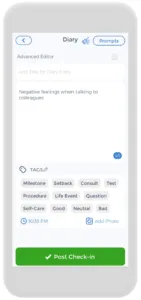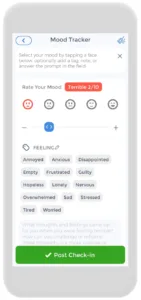
The emotion journal serves as a key aid for deepening your grasp on emotions and their daily impact. This journal begins your journey towards self-exploration and emotional health. You will learn about emotions, their physical roots, and the impact of various emotions on your well-being.
We acknowledge the complexity of emotions. Thus, our guidance doesn’t stop at theory. We show practical steps and the benefits of an emotion journal. This tool helps track your mood and understand emotional patterns. By spending a few minutes daily on reflection and recording, you’ll spot patterns and triggers. This enables strategies for handling tough emotions.
This method suits anyone facing anxiety, depression, or seeking better emotional awareness and mood management. We aim to enhance your emotional insight, improve self and other relationships, and boost your mood and overall well-being. Regular use of the journal will sharpen your emotional management skills, leading to a more satisfying and balanced life.[1][2]
Understanding The Basics of Emotions
Emotions are a complex set of psychological and physiological responses that are triggered by our circumstances and our perception of the world around us. They can be positive or negative and can range from mild to intense. Understanding emotions is important for maintaining good mental health and managing stress.
What are Emotions?
Emotions represent an intricate connection between mind and body, influencing both our mental and physical health. Physiologically, they trigger numerous changes in the brain and body, such as variations in heart rate, breathing patterns, and hormone levels. These alterations are typically set off by external circumstances or internal triggers, like a tense scenario or a joyful memory.
But emotions are not just physical responses. They are also deeply subjective experiences that are shaped![]() by a range of factors, including genetics, environment, moods and past experiences. As such, emotions can be highly personal and can vary widely from person to person.
by a range of factors, including genetics, environment, moods and past experiences. As such, emotions can be highly personal and can vary widely from person to person.
One of the most important aspects of emotions is their role in our mental health. Emotions can be powerful indicators of our mental state and can serve as important signals that something is not quite right. For example, feelings of sadness or anxiety can be early warning signs of depression or anxiety disorders.
At the same time, emotions can also have other benefits and a positive impact on our mental health. Positive emotions, such as joy and contentment, can help us build resilience and cope with stress. They can also promote greater social connection and help us build and maintain stronger relationships and create more with others.
The Physiological Basis of Mood and Emotion
As humans, our emotional experiences are not just subjective – they also have a profound impact on our physical health. Emotions are complex, involving a dynamic interplay between our mind and body. When we experience emotions, our body responds to a range of physiological changes, including alterations in heart rate, breathing, and hormone levels.
For example, when we feel fearful or anxious, our body prepares for action by releasing the stress hormone cortisol, which can increase heart rate and cause rapid breathing. Similarly, when we feel happy or content, our body responds by releasing endorphins, which can induce a sense of well-being and calm.
These physiological responses to emotions are triggered by a wide range of internal and external stimuli. For instance, the sight of a loved one may trigger feelings of joy and contentment, while a stressful situation at work may induce more negative feelings because of anxiety and tension. Moreover, our emotions are shaped by a complex interplay of factors, including genetics, environment, and past experiences. This means that emotions can vary widely from person to person, and can even change over time as we grow and develop.
Understanding the physiological basis of emotions is essential for maintaining good mental health and managing stress. By becoming more aware of how our emotions affect us physically, we can develop strategies to cope with difficult emotions and build resilience in the face of adversity. So, the next time you experience an emotional response, take a moment to observe how your body is reacting. With practice, you can learn to manage your emotions in a way that promotes better health and well-being.
Types of Emotions
Emotions can be broadly categorized into six primary types. Each emotion serves a specific purpose and can be triggered by different stimuli.
- Happiness: positive emotion that can be triggered by things like achieving a goal, spending time with loved ones, or engaging in a favorite activity
- Sadness: negative emotion that can be triggered by loss, disappointment, or feelings of isolation
- Fear: negative emotion that can be triggered by perceived danger or threats, real or imagined
- Anger: negative emotion that can be triggered by feeling frustrated, threatened, or wronged
- Surprise: an emotion that can be triggered by unexpected events or experiences
- Disgust: negative emotion that can be triggered by things like unpleasant smells, tastes, or sights
The Importance of Emotional Awareness
 Being aware of our emotions is crucial for understanding ourselves and others. It enables us to develop a deeper understanding of the complex interplay of emotions in our daily lives. By acknowledging and accepting our emotions, we can learn to communicate better with others, manage stress more effectively, and build stronger, more meaningful relationships.
Being aware of our emotions is crucial for understanding ourselves and others. It enables us to develop a deeper understanding of the complex interplay of emotions in our daily lives. By acknowledging and accepting our emotions, we can learn to communicate better with others, manage stress more effectively, and build stronger, more meaningful relationships.
One way to raise our emotional awareness is through mindfulness practice. This exercise involves becoming more present at the moment and observing our thoughts and emotions without judgment. Another way is through self-reflection and journaling, where we can explore our emotions more deeply and gain insight into our patterns of thinking and behavior.
Moreover, emotional awareness can help us navigate challenging situations more effectively, whether in our personal or professional lives. By recognizing and managing our own emotions, we can also become more attuned to the emotions of others, leading to greater empathy and understanding.
How Emotion Can Impact Health
Emotions deeply affect our physical well-being. Stress, a widespread negative emotion, is associated with various health issues. These include heart disease, elevated blood pressure, and reduced immune efficiency. Prolonged stress can heighten the likelihood of mental health challenges, like depression and anxiety disorders.
Other negative emotions, such as anger and sadness, can also have adverse effects on physical health. For instance, frequent episodes of anger have been linked to an increased risk of heart attack and stroke, while prolonged feelings of sadness can lead to chronic pain and fatigue.
On the other hand, positive emotions, such as joy and contentment, can have a protective effect on physical health. One study has shown that people who experience positive emotions regularly are more likely to have stronger immune systems, lower rates of chronic disease, and longer life expectancies.
But emotions are not just about physical health. They also play a critical role in mental health. Negative emotions, such as anxiety and depression, can have a significant impact on mental well-being, leading to symptoms such as persistent sadness, difficulty sleeping, and loss of interest in activities. Conversely, positive emotions can help promote mental well-being by fostering feelings of happiness, satisfaction, and contentment.[3][4][5][6]
Using an Emotion Journal: Tracking Your Mood
An emotion or mood journal is a tool that you can use to keep track of your emotions over time. It involves setting aside a few minutes each day to reflect on your emotions, and writing down the date, time, and a brief description of the emotion you are feeling. By doing this consistently, you can start to identify patterns and triggers in your emotions and develop strategies for managing difficult emotions. Emotion journals can be especially helpful for people who struggle with anxiety, depression, or other mental health conditions or mood disorders. They can also be a useful tool for anyone looking to improve their emotional awareness and build healthier relationships with themselves and others.
Getting Started with an Emotion Journal
To get started with a mood journal, it’s important to find a notebook or journal and a pen. Some apps can be used. At the end of this article, we will show you a useful app for this specific purpose. Set aside a few minutes each day to reflect on your emotions. Choose a time of day that works best for you, such as in the morning or before bed. Begin by writing down the date and time, and then describe the emotion you are feeling. It’s important to be honest with yourself and write down how you are truly feeling, even if it is uncomfortable or difficult.
If you’re not sure where to start, consider using a daily mood tracker or chart to help you to track moods and identify the more frequent emotions you experience. You can also note any behaviors or actions that the emotion caused you to take. This can help you identify patterns in your emotions and behaviors, which can help manage difficult emotions.
Remember to practice self-compassion as you explore and process your emotions. It’s important to be kind to yourself and remember that everyone experiences difficult emotions from time to time. By taking the time to reflect on and track your feelings, you can develop greater emotional awareness and the ability to build healthier relationships with yourself and others.
Components of an Emotion Journal
While it can be difficult to get started on a mood journal, here are some notes on some commonly used components to help you start keeping track of your moods.
Daily Mood Chart
This is a mood chart or table where you can record and track your mood each day. You might use a numerical scale (e.g. 1-10) or a descriptive scale (e.g. sad, happy, anxious) to rate your mood. This mood tracker or chart can help you identify patterns in your emotions and track changes over time. Also, identify if there is an important thing that affects your mood. For example, exercise might make someone feel less depressed.
numerical scale (e.g. 1-10) or a descriptive scale (e.g. sad, happy, anxious) to rate your mood. This mood tracker or chart can help you identify patterns in your emotions and track changes over time. Also, identify if there is an important thing that affects your mood. For example, exercise might make someone feel less depressed.
Behaviors or actions this emotion caused me to take
This section focuses on logging behaviors or actions prompted by your emotions. For instance, experiencing depression or anxiety might lead you to skip social events or display compulsive behaviors. Keeping track of your actions and responses to negative emotions offers insights into the influence of your feelings on your behavior.
Identify the more frequent emotional experiences
This component involves identifying the emotions that you experience most frequently. This can help you become more aware of the emotions that you tend to feel most often and develop strategies for managing them. Depending on your schedule, aim to do an in-depth analysis every week or month. Some apps can do an in-depth analysis automatically.
Tips for Using an Emotion Journal
- Be honest with yourself: Write down how you are truly feeling in great detail, even if it is uncomfortable or difficult. You can describe the situation, the physical sensations you are experiencing, and the thoughts that go through your mind.
- Look for patterns: After a few days or weeks of journaling, look for patterns in your emotions. Are there certain times of day or situations that trigger particular emotions? Try to identify what might be causing these patterns. Are there any recurring themes that may be worth exploring further?
- Practice self-compassion: It is important to be kind and gentle with yourself as you explore and process your emotions. Remember that everyone experiences difficult emotions from time to time. Try to extend the same compassion to yourself that you would to a dear friend who is going through a tough time. You can also use your journal to write down some encouraging words to yourself, such as “I am doing the best I can” or “I am worthy of love and support.”
Why Using an Emotion Diary is Good For Your Health
Keeping an emotion diary is a powerful tool for improving your emotional well-being. By recording your emotions on a regular basis, you can gain valuable insight into your emotional patterns and triggers. You can use this information to identify areas where you may need additional support or resources to manage your emotions more effectively.
Furthermore, the idea of keeping an emotion diary can help you develop greater self-awareness, focus and mindfulness. By taking the time to reflect on and record your emotions and experiences, you can cultivate a deeper understanding of your own thoughts and feelings. This can help you make more informed decisions and respond more effectively to challenges and stressors in your life.
In addition, using an emotion diary can help you track your own moods and patterns and progress to positive ones over time. By reviewing your entries regularly, you can see how your emotional patterns and experiences are changing and evolving. This can be a powerful motivator for continuing to work on your emotional well-being and making positive changes in your life. This can also be useful next time you see your therapist since all the information will be recorded and there for you!
Using Mood Tracker Apps to Track Moods
Having a mood diary is crucial for your health, and the CareClinic app can help with that. You can use the app as your health and clinical journal. Just go to the diary section of the app and enter your daily moods or other triggers, as they occur. There are also specific sections on the app to track each of these. You can also input information about your daily activities, sleep patterns, diet, and personal circumstances or other notes. The app will spot patterns and create a detailed report based on the symptoms you give it. Next time you visit the therapist, this information will be handy in your pocket.
The app also has a medication section where you can precisely track the medicine you are taking and receive reminders on when to take each medication. We know how easy it can be to forget about taking medications, so we hope to make it as easy and streamlined as possible so you make a better health decision. Mobile apps such as the CareClinic app has given people the ability to track their health much more easily!
Conclusion
In conclusion, the Emotion Journal is a powerful tool for improving emotional well-being. By recording emotions regularly, individuals can gain insight into their emotional patterns and triggers, develop greater self-awareness and mindfulness, and track progress over time. The journaling itself can be especially helpful for those struggling with anxiety, depression, or other mental health conditions or mood disorders.
By acknowledging and accepting emotions, individuals can learn to communicate better with others, manage stress effectively, and build stronger, more meaningful relationships with themselves and others. Ultimately, the Emotion Journal can help cultivate greater emotional awareness, to build healthier relationships, and improve overall well-being.
Sources
- https://www.apa.org/pubs/journals/emo
- https://www.webmd.com/balance/what-to-know-about-emotional-health
References
- “Journaling for Emotional Wellness”. https://healthlibrary.brighamandwomens.org/library/diseasesconditions/adult/1%2C4552
- “The Benefits of Journaling for Stress Relief and Emotional Well-being | Health Centre NZ”. https://healthcentre.nz/the-benefits-of-journaling-for-stress-relief-and-emotional-well-being/
- “Positive Emotions and Your Health | NIH News in Health”. https://newsinhealth.nih.gov/2015/08/positive-emotions-your-health
- “It's Official: Happiness Really Can Improve Health”. https://time.com/4866693/happiness-improves-health/
- “Why Having Lots of Feelings Is Good For Your Health”. https://time.com/4828450/positive-emotions-inflammation/
- “The First Real Proof That Your Outlook Affects Longevity”. https://time.com/4599529/to-live-longer-you-have-to-stay-happy/
- “Journaling for Emotional Wellness | Northwestern Medicine”. https://encyclopedia.nm.org/HeartHealth/1%2C4552
- “Journaling and Your Health | American Diabetes Association”. https://diabetes.org/health-wellness/mental-health/journaling-your-health


